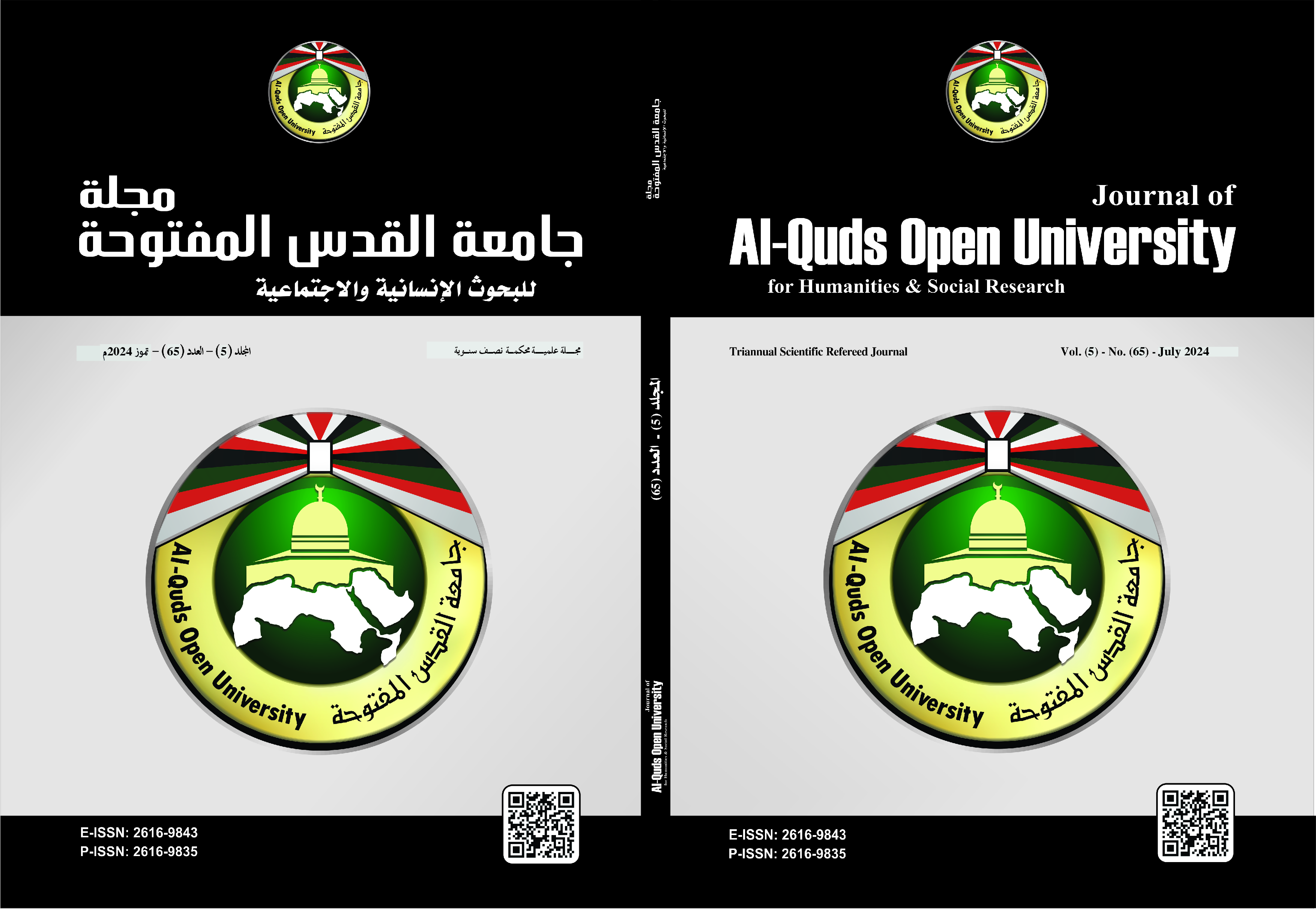Prisoners in the Palestinian literature are live models of resistance: Ali Al-Jaafari as a role model
Keywords:
Palestinian prisoners, the battle of the empty stomach, Ali Al-JaafariAbstract
Palestinian prisoners constitute living examples of steadfastness, confrontation, and failure to break in the face of the jailer, who uses excessive force in oppression and torture.
Objectives: The study aimed to:
(1) Documenting the creativity of Palestinian prisoners in confronting the jailer, (2). Identifying the hunger strike - the battle of the empty stomach - as a method of resistance to the occupation. (3) Recognizing the high level of sacrifice of the Palestinian prisoner. (4) Identifying examples of prisoners-martyrs remaining in the Palestinian national memory, (5) Identifying how to place the sacrifices and struggles of prisoners within the context of resistance knowledge that contributes to self-liberation.
Methodology: The study adopted the descriptive analytical approach and text analysis in tracking the heroism of Palestinian prisoners in Israeli occupation prisons.
Results: The study concluded:
(1) The majority of previous generations of Palestinian prisoners are military combatants, who were captured, (2) The successive strikes in prisons took place under the slogans of dignity and the right to live in dignity in prison. (3) Prison literature emerged, which became an important and original part of the Palestinian national narrative.(4) Palestinian prisoners are living examples of resistance, especially those who died as martyrs in captivity. (5) All sources of the study focused on the martyr prisoner Ali Al-Jaafari, as a model of resistance and confrontation of the jailer.
Conclusion: The Palestinian prisoners are living examples of resistance and steadfastness in general. The study revealed that the “prisoner martyr Ali al-Jaafari” was the most prominent model and motivator of resistance among his companions.
References
المصادر والمراجع باللغة العربية
حج محمد، فراس (14/02/2022). ندوة دولية عبر زوم لمناقشة أدب الأسرى الفلسطينيين. ديوان العرب. يُنظر الرابط الآتي (شوهد في 15/04/2024):
https://www.diwanalarab.com// ندوة-دولية-عبر-زوم-لمناقشة-أدب-الأسرى (accessed at 18/03/2022).
الرجوب، جبريل. (2015). نفحة يتحدث: 35 عامًا على معركة الأمعاء الخاوية. عمّان: دار المناهج للنشر والتوزيع.
أبو عباية، حافظ، والبيروتي، محمد. (2013). نصب تذكاري. رام الله: وزارة شئون الأسرى والمحررين.
حمدونة، رأفت. (2016). أدب السجون لا ينفصل عن الأدب العربي. الموقع الالكتروني لـ "مركز الأسرى للدراسات". يُنظر الرابطين:
https://alasra.ps/ar/index.php?act=post&id=27645 (accessed at 18/03/2022)
https://alasra.ps/ar/uploads/documents/888b6605535abd479ec8e25d07a2795e.pdf (accessed at 18/03/2022).
العصا، عزيز. (2022). أدب الأسرى الفلسطينيين: وثائق تبيّن شراسة السجَّان.. وتحفظ للوطن تاريخه. مجلة المقدسية. جامعة القدس. العدد (14). ص: 171-195.
عيسى، خليل (2021). سَفَرٌ مع سِفْرٍ- رواية "الدهيشي" للكاتب والأديب عيسى قراقع: ثلاث وخمسون حكاية دهيشية تُمَجْهرُ المعاناة بصبغةٍ أدبيةٍ ضافيةٍ. مقال منشور في صحيفة القدس، بتاريخ: 16/12/2021م، ص: 10.
قراقع، عيسى (2021). الدهيشي. رام الله: وزارة الثقافة الفلسطينية.
أبو لبن، صالح. (2016). أربعون يومًا على الرصيف. بيت لحم-مخيم الدهيشة: هيئة شؤون الأسرى والمحررين.
References
Abu Abaya, Hafez and Al-Beiruti, Mohammad. (2013). Memorial (in Arabic). Ramallah: Ministry of Prisoners and Ex-Prisoners Affairs.
Al assa, Aziz. (2022). Literature of Palestinian prisoners: Documents that show the ferocity of the prison guard...and preserve the nation’s history. Al-Maqdisiya Magazine. Al-Quds University. Number (14). pp. 171-195.
Hajj Muhammad, Firas (02/14/2022). An international seminar via Zoom to discuss the literature of Palestinian prisoners. Diwan al-Arab. https://www.diwanalarab.com//International-symposium-via-Zoom-to-discuss-prisoners-literature (accessed on 15/4/2024.
Hamdouna, Raafat. (2016). Prison literature is inseparable from Arabic literature. The website of the Prisoners Center for Studies. https://alasra.ps/ar/index.php?act=post&id=27645;
https://alasra.ps/ar/uploads/documents/888b6605535abd479ec8e25d07a2795e.pdf (accessed at 18/03/2022
Issa, Khalil (2021). Travel with a book - the novel “Dahishi” by the writer and literarian Issa Abu Laban, Saleh. (2016). Forty days on the dock (in Arabic). Bethlehem - Dheisheh Camp: Commission for Prisoners’ and Ex-Prisoners’ Affairs.
Qaraqe: fifty-three Dahishi stories that highlight suffering with a rich literary tone (in Arabic). An article published in Al-Quds newspaper, dated: 12/16/2021 AD, p. 10.
Qaraqe, Issa (2021). Al-Dahishi (in Arabic). Ramallah: Palestinian Ministry of Culture.Rajoub, jibril. (2015). Nafha speaks: 35 years since the battle of the empty stomach (in Arabic). Amman: Dar Al-Manhaj for Publishing and Distribution.
Downloads
Published
How to Cite
Issue
Section
License
Copyright (c) 2024 Journal of Al-Quds Open University for Humanities and Social Studies

This work is licensed under a Creative Commons Attribution 4.0 International License.
- The editorial board confirms its commitment to the intellectual property rights
- Researchers also have to commit to the intellectual property rights.
- The research copyrights and publication are owned by the Journal once the researcher is notified about the approval of the paper. The scientific materials published or approved for publishing in the Journal should not be republished unless a written acknowledgment is obtained by the Deanship of Scientific Research.
- Research papers should not be published or republished unless a written acknowledgement is obtained from the Deanship of Scientific Research.
- The researcher has the right to accredit the research to himself, and to place his name on all the copies, editions and volumes published.
- The author has the right to request the accreditation of the published papers to himself.













_2.png)
_.png)
_2.png)
_1.png)
_.png)

